
Sustainable and Resilient Infrastructure
Scope & Guideline
Advancing Resilience: Shaping the Future of Infrastructure
Introduction
Aims and Scopes
- Infrastructure Resilience Assessment:
This area encompasses methodologies and frameworks aimed at evaluating the resilience of various infrastructure systems, including transportation, water supply, and energy networks. It involves probabilistic risk assessments, modeling, and decision support tools that inform infrastructure planning and management. - Sustainable Infrastructure Development:
The journal promotes research on sustainable practices in infrastructure development, including the use of eco-friendly materials, energy-efficient designs, and strategies to reduce the carbon footprint of infrastructure projects. - Climate Change Adaptation and Mitigation:
Research in this scope focuses on understanding and addressing the impacts of climate change on infrastructure, including the development of adaptive strategies and technologies to enhance resilience against climate-related hazards. - Interdependencies of Critical Infrastructure Systems:
This area explores the interconnections and dependencies between different infrastructure sectors, analyzing how failures in one system can affect others and developing strategies to manage these interdependencies. - Community and Stakeholder Engagement in Infrastructure Planning:
The journal emphasizes the importance of involving communities and stakeholders in the planning and decision-making processes for infrastructure projects, ensuring that their needs and perspectives are considered for more resilient outcomes.
Trending and Emerging
- Digital Technologies and Infrastructure Resilience:
There is a growing focus on the integration of digital technologies, such as GIS, big data analytics, and machine learning, to enhance the resilience of infrastructure systems. These technologies support better decision-making and predictive modeling. - Post-Disaster Recovery and Reconstruction:
Research exploring effective strategies for post-disaster infrastructure recovery is gaining traction, emphasizing the importance of rapid assessment, community involvement, and sustainable rebuilding practices. - Nature-Based Solutions for Infrastructure Challenges:
The use of nature-based solutions, such as green infrastructure and ecosystem services, is increasingly recognized as an effective way to enhance resilience while providing multiple benefits, including improved urban livability. - Social Equity in Infrastructure Planning:
Emerging themes around social equity highlight the need for inclusive infrastructure planning that considers the impacts on marginalized communities and ensures equitable access to resilient infrastructure. - Climate Risk and Infrastructure Interdependence:
Research examining the interdependencies of infrastructure systems under climate risk is becoming more prominent, as understanding these relationships is crucial for developing comprehensive resilience strategies.
Declining or Waning
- Traditional Infrastructure Design Practices:
There is a noticeable decline in research focused solely on conventional infrastructure design methods, as the field increasingly shifts towards incorporating resilience and sustainability principles in all aspects of infrastructure development. - Generalized Risk Assessment Approaches:
While risk assessment remains a critical component of infrastructure resilience, there is a waning interest in generalized methodologies that do not account for specific contextual factors, such as local conditions, community needs, and climate variables. - Single-Disciplinary Approaches to Infrastructure Challenges:
The journal is moving away from research that addresses infrastructure challenges from a single discipline perspective, as interdisciplinary collaboration is increasingly recognized as essential for tackling complex infrastructure issues.
Similar Journals

Gradevinar
Unlocking Access to Cutting-Edge Engineering InsightsGradevinar, published by the Croatian Society of Civil Engineers-HSGI, is a leading Open Access journal in the field of Civil and Structural Engineering, with a significant history that dates back to its inception in 1980. This journal, with the ISSN 0350-2465 and E-ISSN 1333-9095, has established itself as a vital platform for disseminating innovative research and practical developments in civil engineering, particularly since it became Open Access in 2000, facilitating unrestricted access to its wealth of knowledge. As of 2023, Gradevinar is ranked in the third quartile (Q3) of Scopus’s Civil and Structural Engineering category, demonstrating its growing influence and relevance in the academic community, with a current ranking of #255 out of 379 journals in the field. Researchers, professionals, and students benefit from this journal's commitment to high-quality content that reflects the latest advancements and best practices in civil engineering, contributing to both technical proficiency and sustainable development in infrastructure projects across Croatia and beyond.
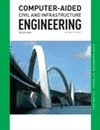
COMPUTER-AIDED CIVIL AND INFRASTRUCTURE ENGINEERING
Exploring the Intersection of Design and ComputationCOMPUTER-AIDED CIVIL AND INFRASTRUCTURE ENGINEERING, published by WILEY, stands as a leading journal in the domains of civil and structural engineering, computational theory, and computer-aided design since its inception in 1986. With an impressive ISSN of 1093-9687 and E-ISSN of 1467-8667, this esteemed UK-based journal holds a prestigious position in the academic community, reflected by its Q1 ranking in numerous relevant categories, including Civil and Structural Engineering and Computer Graphics as of 2023. The journal is renowned for promoting innovative research that utilizes computational techniques to solve complex engineering problems, making it an essential resource for researchers, professionals, and students alike. Despite its lack of open access options, the journal garners significant interest due to its rigorous peer-review process and high-impact articles, underlining its importance in the advancement of infrastructure engineering practices and technologies. With a Scopus ranking placing it among the top journals in various engineering and computer science fields, COMPUTER-AIDED CIVIL AND INFRASTRUCTURE ENGINEERING continues to foster knowledge and collaboration, ultimately contributing to the future of smart and resilient infrastructure development.
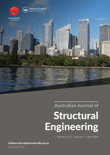
Australian Journal of Structural Engineering
Bridging Theory and Practice in Structural EngineeringThe Australian Journal of Structural Engineering (ISSN: 1328-7982, E-ISSN: 2204-2261), published by TAYLOR & FRANCIS AS, serves as a pivotal platform for disseminating high-quality research in the fields of civil and structural engineering, mechanical engineering, and mechanics of materials. With a publications timeline from 2008 to 2024, this journal plays a crucial role in advancing knowledge and practice within its disciplines, boasting Q3 rankings across various categories as of 2023. Although it operates under a subscription model, the journal remains accessible to a diverse audience, including researchers, professionals, and students, seeking to enrich their understanding and engagement with contemporary engineering challenges. The Australian Journal of Structural Engineering is not only a repository of innovative ideas but also a vital resource for fostering collaboration and sparking discussion among scholars and practitioners striving for excellence in engineering design and analysis.
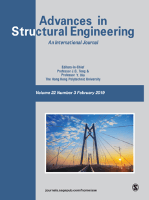
ADVANCES IN STRUCTURAL ENGINEERING
Unveiling Breakthroughs in Structural EngineeringADVANCES IN STRUCTURAL ENGINEERING, published by SAGE PUBLICATIONS INC, is a leading journal dedicated to the advancement of knowledge in the fields of Building and Construction, as well as Civil and Structural Engineering. With a solid impact factor and a commendable Scopus ranking (Rank #60 in Building and Construction, Rank #105 in Civil and Structural Engineering), this journal stands at the forefront of academic research, providing a platform for high-quality articles that contribute significantly to the discipline. Covering a range of topics from innovative construction techniques to sustainable engineering practices, the journal aims to foster collaborative dialogue among researchers, industry professionals, and students alike. As of 2023, it boasts impressive category quartiles, ranking Q1 in Building and Construction and Q2 in Civil and Structural Engineering. ADVANCES IN STRUCTURAL ENGINEERING is a vital resource for those looking to stay abreast of emerging trends and groundbreaking developments in structural engineering, promoting an environment of continuous learning and application of best practices. With a convergence of research from 1999 to 2024, the journal not only emphasizes theoretical frameworks but also bridges the gap between academia and practical application in engineering projects.
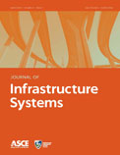
Journal of Infrastructure Systems
Advancing the Future of Infrastructure EngineeringJournal of Infrastructure Systems is a premier publication in the field of Civil and Structural Engineering, managed by the ASCE - American Society of Civil Engineers. Established in 1995, this journal serves as a vital platform for the dissemination of cutting-edge research related to diverse aspects of infrastructure systems, including construction, operation, and maintenance. With an impressive Scopus ranking placing it in the 77th percentile among its peers, it is recognized within the Q2 category for Civil and Structural Engineering, reflecting its significant impact on the discipline. Researchers, professionals, and students will find the journal invaluable as it hosts a wide range of contributions that address contemporary challenges in infrastructure development, sustainability, and resilience. Although not an open-access journal, it ensures superior quality and scholarly rigor, making it a critical resource for advancing knowledge in the infrastructure domain.
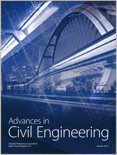
Advances in Civil Engineering
Innovating Infrastructure, Inspiring ChangeAdvances in Civil Engineering is a leading peer-reviewed journal published by HINDAWI LTD, dedicated to advancing knowledge and innovation in the field of civil and structural engineering. Holding an esteemed Q2 ranking in the 2023 category for Civil and Structural Engineering, this journal serves as a vital platform for disseminating cutting-edge research and practical applications that address contemporary challenges in infrastructure development, sustainable design, and material science. Launched in 2008 and operating as an Open Access journal since 2009, it promotes the free exchange of ideas by ensuring that all articles are accessible to researchers, professionals, and students globally. The journal is also indexed in Scopus, ranking at #142 out of 379 in its category, situating it within the 62nd percentile of its peers. With a focus on interdisciplinary collaboration and innovative solutions, Advances in Civil Engineering contributes significantly to the ongoing evolution of engineering practices and education, making it an essential resource for anyone involved in or studying the ever-evolving field of civil engineering.
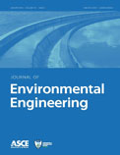
JOURNAL OF ENVIRONMENTAL ENGINEERING
Exploring innovative pathways to environmental sustainability.JOURNAL OF ENVIRONMENTAL ENGINEERING, published by the American Society of Civil Engineers (ASCE), stands as a pivotal platform within the realm of environmental engineering and civil infrastructure. With an ISSN of 0733-9372 and an E-ISSN of 1943-7870, this esteemed journal has been delivering high-quality research since its inception in 1973 and continues to play a crucial role in advancing knowledge through to 2024. The journal boasts respectable impact factors, achieving Q2 rankings in Civil and Structural Engineering, Environmental Engineering, and Environmental Science, while also maintaining a solid presence in Environmental Chemistry. With Scopus rankings reflecting a strong competitive advantage across various specializations, it serves as a vital resource for researchers, professionals, and students focused on solving complex environmental challenges. Though not an open-access publication, its rigorous selection process ensures that only high-caliber studies are disseminated, making it an indispensable read for anyone involved in the interdisciplinary fields linking engineering and environmental sustainability. Addressing contemporary issues and shaping future innovations, the JOURNAL OF ENVIRONMENTAL ENGINEERING remains committed to fostering dialogue and disseminating impactful research.
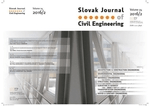
Slovak Journal of Civil Engineering
Exploring groundbreaking solutions in civil engineering.Welcome to the Slovak Journal of Civil Engineering, a premier open-access publication dedicated to advancing the field of civil engineering. Published by SCIENDO, this journal has been providing a platform for the dissemination of groundbreaking research since 2010, ensuring that all articles are freely accessible to a global audience. With a commitment to promoting innovation and excellence within civil engineering, the journal covers a wide range of topics, including structural engineering, transportation systems, geotechnics, and environmental engineering. The Slovak Journal of Civil Engineering is designed to engage a diverse community of researchers, professionals, and students, fostering collaboration and knowledge-sharing to address contemporary challenges in the field. With its open-access model, the journal not only enhances visibility for authors but also ensures that the latest findings and methodologies reach practitioners and academics alike, making it an essential resource for anyone interested in civil engineering advancements. Stay connected with the evolving landscape of civil engineering through this influential publication.

Urban Water Journal
Navigating the Future of Sustainable Urban Water ManagementUrban Water Journal, published by TAYLOR & FRANCIS LTD, stands as an essential resource in the fields of Geography, Planning and Development and Water Science and Technology, reflecting its strong academic rigor and substantial contributions to urban water management and research since its inception in 2004. With an impressive impact factor indicated by its Q2 ranking in both disciplines, this journal serves as a vital platform for researchers, practitioners, and policymakers to disseminate and access pioneering studies and innovations related to urban water systems. The journal's focus extends to various aspects of urban water usage, sustainability, and policy-making, ensuring that readers are equipped with the latest findings that address pressing global challenges. Located in the United Kingdom, Urban Water Journal is committed to advancing knowledge in urban water resilience and sustainability, making it a crucial publication for those engaged in this dynamic and critical field. For researchers and professionals dedicated to impactful solutions in urban water management, this journal offers a comprehensive venue for sharing insights and fostering collaboration.
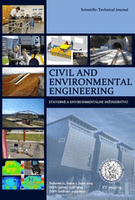
Civil and Environmental Engineering
Empowering scholars to build a sustainable tomorrow.Civil and Environmental Engineering, published by SCIENDO, is a prominent open-access journal dedicated to advancing research and knowledge in the fields of civil and structural engineering, as well as environmental engineering. Since its inception in Germany, it has been committed to promoting cutting-edge studies and methodologies that address the pressing challenges in these domains. With an ISSN of 1336-5835 and E-ISSN of 2199-6512, the journal is accessible to a global audience, having adopted an open-access policy since 2014 to enhance the visibility and dissemination of scholarly work. The journal currently holds a Q3 ranking in both Civil and Structural Engineering and Environmental Engineering, as of 2023, reflecting its growing influence within the academic community. It operates within a framework of rigorous peer-review standards and encourages contributions that not only contribute to theoretical advancements but also have practical implications for real-world applications. Researchers, professionals, and students alike will find invaluable insights and innovative perspectives in the latest studies published from 2018 to 2024.